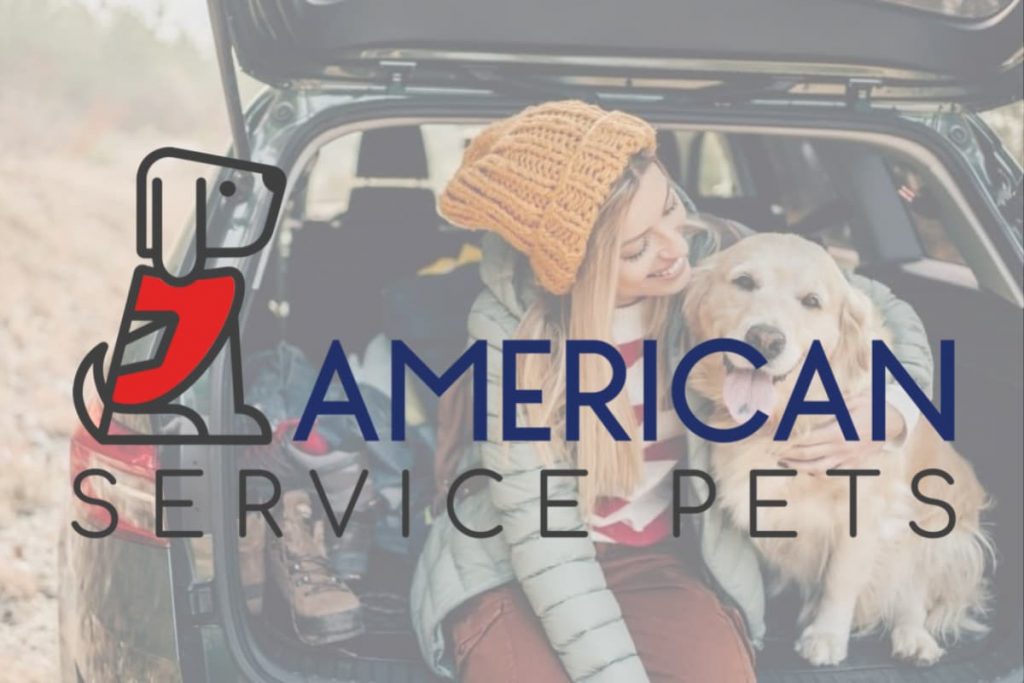How to Get Your Emotional Support Animal Letter
in Utah

People recovering from psychological trauma often need their pets for emotional support, but not all landlords are accommodating. Federal and state laws provide some rights to pet owners who certify their pets as Emotional Support Animals (ESA). This provides protection from rental property pet rules and fees under the federal Fair Housing Act.
American Service Pets helps people get the certification they need for rental housing and public access. Certifying your pet as an Emotional Support Animal in Utah can also fulfill workplace and travel requirements. Pet deposits and extraneous fees no longer apply. Find out if you qualify for an Emotional Support Animals letter with our simple test.
The Purpose of Emotional Support Animals
Utah state law respects the necessity of Emotional Support Animals for people recovering from emotional trauma in some circumstances and protects the owners’ rights. These animals can be any animal that you feel a bond with, and that helps you cope with tricky life situations.. Utah only recognizes dogs as service animals.
ESAs are the key to an everyday functioning life for people who experience mental disorders because of their many advantages. Here are some of the most beneficial aspects of certifying your support animal:
Naturopathic Therapy
The benefits of living with an animal are not breaking news. We have long known that having a pet has unique rewards that aren’t unlike some benefits of depression medicines. More Americans than ever have been turning to a more natural approach to health ailments to avoid risks associated with drugs and pills. Certified Emotional Support Animals are natural medicine for PTSD, depression, and stress-related issues. Animals also inspire play and activity, another health boost.
Authentic Comfort
Emotional trauma causes long-lasting problems. It’s easy to find yourself trapped in a negative thought pattern or doubting your self-worth. Add in the regular stressors of everyday life, and you might find yourself with a bad case of anxiety. Merely interacting with an animal you love lowers blood pressure, heart rate and reduces stress.
Happiness Booster
Caring for an animal you love raises levels of serotonin and dopamine, natural mood enhancers. They make you laugh, ease loneliness, and provide comfort. In short, they make you feel good. People going through a hard time finding caring for a pet breaks the negative thought chain and provides a space for happiness to break through.
There are aspects of personal and social life that people with emotional disorders have trouble navigating without the support of their animals. American Service Pets provides a fast and easy way for pet owners to get certification in less than a half-hour, in most cases.
Take the test to see if you qualify for a Utah ESA letter letter now.
Emotional Support Animals Laws in Utah
The law recognizes Emotional Support Animals as companions that provide support and comfort. They cannot save lives or aid the disabled as service animals. Service animals and Emotional Support Animals serve different purposes and are afforded other rights under the law.
Emotional Support Animals have certain protections under the law, but only if their owners have an authentic certification from a licensed Utah medical professional. Official letters are accepted all over the country, but specific stipulations vary from state to state. Check state laws before you do any traveling.
Housing Laws
Tenants with support animals have equal access to rental housing in Utah under the Fair Housing Act. Landlords may not turn them down for housing, evict them, or ask for a pet deposit. A landlord may ask for a tenant’s ESA letter. Any tenant who presents fraudulent documents is risking legal penalties.


Public Places
Emotional Support Animals in Utah have no right to public access. Trained service animals are allowed in public places, but only if there is no health or safety risk involved. Utah leaves the final decision to the owners of the establishment.
Workplace Laws
The Americans with Disabilities Act protects the rights of the disabled to use a service dog at work. Some people cannot do their job without them. Utah does not support the use of Emotional Support Animals under this act. Obtaining an ESL certification could be the distinguishing factor you need. Employers may change their minds if the animal is small and well-behaved.


Travel Laws
Emotional Support Animals are not guaranteed access to public transportation in Utah, including buses, trains, and ride-share services. The DOT has banned Emotional Support Animals in the cabins of airplanes as of 2020. Pet owners will need to check with the airline to learn their policies.
Understanding the laws in Utah will ensure you and your ESA aren’t turned away at some locations. American Service Pets is proud to offer an easy three-step process to provide Emotional Support Animals certification letters to Colorado residents.
FAQ
The Basics
Yes, Utah has its own disability rights laws in addition to following the federal Americans with Disabilities Act (ADA).
Under Utah’s disability rights law, “a qualified service animal is a dog that has been trained or is being trained to do work or tasks for the benefit of someone with a physical, sensory, psychiatric, intellectual, or mental disability.” Examples of service animals according to the ADA are hearing dogs, guide dogs, psychiatric service animals, seizure-alert animals, and allergen-alert animals.
Utah defers to the ADA for the definition of disability. Under the ADA, a disability is a physical or mental impairment that substantially limits one or more major life activities of an individual.
Only dogs are qualified to be service animals under Utah law. The ADA also allows miniature horses to be service animals in some cases.
Misrepresenting an animal as a service animal or falsifying information in order to gain a service animal that is not necessary is considered a Class C misdemanor in the state of Utah.
Yes, Utah State Law provides the same rights of access to service animals-in-training that it does to service animals.
The ADA and Utah law do not provide coverage for emotional support animals, as these animals are not specifically task-trained.
FAQ
Public Accommodations & Travel with a Service Animal
In Utah, service animals may accompany their handlers in all public buildings and facilities; on all highways, walkways, streets, and sidewalks; in all places of amusement or resort to which the public is invited; and in all places of accommodation, including hotels, motels, and lodges. The law doesn’t go into further detail in defining specific examples. The ADA is similarly broad in its definition of public accommodations. The only places that are not covered are religious entities and private clubs unless such a club makes its facilities regularly open to the public.
The only questions that can be asked by an establishment are whether the animal is a service animal required because of a disability and what task(s) the service animal is trained to perform.
Both the ADA and Utah law allow public accommodations to exclude or remove service animals that may be causing a direct threat to health and safety (ie. an animal that is excessively aggressive). Animals that are not housebroken or out of control can also be excluded, but their handlers may still be allowed to enter the premises.
Service animals are allowed on all common carriers under Utah law. This includes a variety of forms of transportation such as all buses and trains. Airplanes are regulated with different rules under the Air Carrier Access Act (ACAA).
Under ADA law, a service animal is covered as a form of reasonable accommodation that employees can request from their employers. Employers can only deny a service animal if its presence would cause an “undue burden” or fundamentally alter the nature of the business.
Under ADA law, a service animal is covered as a form of reasonable accommodation that employees can request from their employers. Employers can only deny a service animal if its presence would cause an “undue burden” or fundamentally alter the nature of the business.
Generally service dogs are allowed in hospital areas like patient rooms and other places where members of the public are allowed to go. They may be barred from sterile environements like operating rooms or burn units. Service dogs are also generally allowed to ride in ambulances with their handlers unless doing so would impede treatment. In this case the hospital needs to provide transportation for the service dog to the facilities.
Yes. Failure to comply with Utah disability law and the ADA can leave businesses open to both civil and criminal liability.
Utah follows the Air Carrier Access Act (ACAA), which defines a service animal as a dog (regardless of breed or size) trained to do work or perform tasks to assist a qualified individual with a disability and may include psychiatric service dogs. Miniature horses are excluded in this definition.
Airlines can require a passenger to provide a U.S. Department of Transportation (DOT) form attesting to the animal’s health, behavior, and training and a U.S. DOT form attesting that the animal can either not relieve itself or can relieve itself in a sanitary manner (if the animal will be on a flight that is 8 or more hours).
The ACAA does not address service animals in-training, so airlines are not required to carry them as they do not meet the requirements of an ACAA-defined service animal. However, airlines can make their own individual policies.
FAQ
Housing Law
Under the Utah Fair Housing Act and the federal Fair Housing Act, individuals with disabilities are entitled to request a reasonable accommodation from their housing provider for their assistance animal. The term “assistance animal” covers service animals, emotional support animals, therapy animals, or any other kind of animals that provide assistance, support, or service. In turn, housing providers are entitled to verify the legitimacy of the request by asking for documentation from a physician, psychiatrist, or other qualified healthcare professional.
Housing providers are not required to provide an accommodation that poses a direct threat to the health or safety of others. For example, if an animal has a history of dangerous behavior or if the animal is out of control, that could be grounds for rejecting the accommodation. The housing provider can also choose not to permit an accommodation if the assistance animal would impose an “undue financial or administrative burden or would fundamentally alter the nature of a housing facility, program, or service.”
Yes. While you cannot be required to pay “pet rent” for a service animal, you may be liable for any damage that your animal may cause.
Yes, the Utah Fair Housing Act and federal Fair Housing Act both provide provisions for ESAs.
FAQ
Discrimination Complaints
For public accommodations access issues, your best course of action is most likely to be filing a complaint directly with the ADA. If you have experienced employment discrimination, you have 180 days to file a claim with the Utah Antidiscrimination and Labor Division (UALD). If you fail to file within 180 days but file before 300 days, your claim will be sent to the Equal Employment Opportunity Commission (EEOC).
Housing discrimination claims can be made through the Utah Antidiscrimination and Labor Division (UALD) within 180 days of the alleged discriminatory act. If you file after 180 days but within 365 days, the UALD will send your claim directly to the U.S. Department of Housing and Urban Development (HUD). You are also not bound to file a claim through this division. Fair Housing Laws allow you to take your complaint directly to court within two years of any discriminatory act.
How to Get Certified for an Emotional Support Animal in Utah
American Service Pets has a quick and easy process to get certified for an Emotional Support Animal. It’s just three simple steps:
Fill Out the Questionnaire
Answer the American Service Pets questionnaire to find out if you’re qualified for an Emotional Support Animals letter in just a few minutes.
Doctor’s Approval
American Service Pets lets you choose to submit your file to a Utah state-licensed doctor or other licensed mental health provider for approval and authorization or find your own. There are doctor or other licensed mental health providers available 24/7. Most requests are approved within minutes and sent to your email address.
Add Your Pet to the National Directory
Adding your pet to the national directory provided by American Service Pets is a critical part of the process. It provides an online profile that shows your pet’s status and certification letter.
Get certified for your support animal today. American Service Pets accepts approximately 95% of applicants within a half-hour. Certification is sent to your email address right away. Fill out our survey to see if you qualify.
The American Service Pets Advantage
American Service Pets has helped more than 45,000 owners validate the status of their Emotional Support Animals. Here’s why we are the service you need:
- The opportunity to confer with a medical professional in Utah
- Free qualification process
- No prescription required
- All-in-one solution to support animal certification issues

Answer a few simple questions to get your pet certified as an Emotional Support Animals in Utah today. Get on the fast track to enjoying all your pet has to offer without the worry of repercussions. If you have additional questions before applying and would like to speak to a real person, call us at (385) 200-2234.
Disclaimer: We would like to emphasize that while the terms “certification” or “registration” may be used in relation to Emotional Support Animals, there is no official certification process for ESAs or any form of ESA registry as of this date. As such, the use of these terms should not be interpreted as legally recognized designations by government or regulatory authorities. Remember, ESAs can provide a valuable source of comfort and support, but their recognition relies on proper documentation from a healthcare professional and adherence to relevant laws and guidelines.

